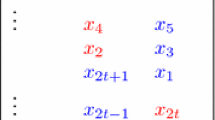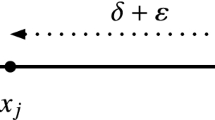Abstract
The lexicographic maximin extension of an ordering is an important and widely used tool in social choice theory. We provide an axiomatization of it by means of five axioms. When the basic ordering is linear the following four (independent) axioms are sufficient: (1) Gärdenfors principle; (2) Neutrality; (3) Strong Fishburn monotonicity; and (4) Extension. Our result may also have applications in the theory of individual choice under uncertainty.
Similar content being viewed by others
References
Arrow KJ, Hurwicz L (1972) An optimality criterion for decision-making under ignorance. In: Carter CF, Ford JL (eds) Uncertainty and expectations in economics. Augustus M. Kelley, Fairfield, NJ
Barbera S (1977) The manipulation of social choice mechanisms that do not leave too much to chance. Econometrica 45: 1573–1588
Barbera S, Pattanaik PK Extending an order on a set to the power set: Some remarks on Kannai and Peleg's approach. (mimeograph, 1982); J Econ Theory (unknown)
Fishburn PC (1972) Even-chance lotteries in social choice theory Theory Decision 3: 18–40
Fishburn PC (1981) Comments on the Kannai-Peleg impossibility theorem for extending orders. (mimeograph, 1981); J Econ Theory (unknown)
Gardenfors P (1976) Manipulation of social choice functions. J Econ Theory 13: 217–228
Gardenfors P (1979) On definitions of manipulation of social choice functions. In: Laffont J-J (ed) Aggregation and revelation of preferences. North-Holland, Amsterdam
Heiner R, Packard DJ (1982) A uniqueness result for extending orders; with application to collective choice as inconsistency resolution. (mimeograph, 1982); J Econ Theory (unknown)
Kannai Y, Peleg B A note on the extension of an order on a set to the power set, (mimeograph, 1981); J Econ Theory (unknown)
Kelly J (1977) Strategy-proofness and social choice functions without single-valuedness. Econometrica 45: 439–446
Krantz D, Luce RD, Suppes P, Tversky A (1971) Foundations of measurement. Wiley, New York
Luce RD, Raiffa H (1957) Games and decisions. Wiley, New York
Milnor J (1954) Games against nature. In: Thrall RM, Coomos CH, Davis RL (eds) Decision processes. Wiley, New York
Packard DJ (1979) Preference relations. J Math Psychol 19: 295–306
Packard DJ (1981) Plausibility orderings and social choice. Synthese 49: 415–418
Pattanaik PK (1978) Strategy and group choice. North-Holland, Amsterdam
Rawls J (1971) Theory of justice. Harvard University Press, Cambridge, MA
Rescher N (1976) Plausible reasoning. Van Gorcum, Assen/Amsterdam
Author information
Authors and Affiliations
Rights and permissions
About this article
Cite this article
Pattanaik, P.K., Peleg, B. An axiomatic characterization of the lexicographic maximin extension of an ordering over a set to the power set. Soc Choice Welfare 1, 113–122 (1984). https://doi.org/10.1007/BF00452883
Received:
Accepted:
Issue Date:
DOI: https://doi.org/10.1007/BF00452883




